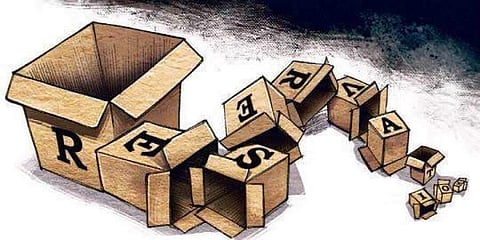

NEW DELHI: The recent Supreme Court judgment on reservations has set off a political storm in the cow belt states, especially Bihar, where Assembly elections are due this year, with leaders of pro-NDA parties and the Mahagathbandhan voicing alarm. While the Bhim Army has called for a bandh on February 23, Rajasthan Chief Minister Ashok Gehlot has announced a dharna on February 16.
The SC order has also arraigned employees against various governments in states where castes have to underline the political and electoral power play. It was the Uttarakhand government, which had first challenged the provision for promotions in reservations for depressed classes claiming it could not be deemed to be a fundamental right, a stand, which was shot down by the Uttarakhand High Court. The state had then moved the apex court, which vacated the HC ruling, allowing the state to shed reservations in promotions.
Post the ruling, Uttarakhand finds itself in a peculiar situation with the SC/ST employee union’s threatening a stir. The ruling has set off a political war too. Jaswant Singh Rawat, a political commentator said, “Uttarakhand will find it difficult to accommodate the demands of SC/ST and OBCs after the verdict. There will be long-term political damage if the situation is not addressed.” Karam Ram, state president of SC/ST government employees, said there are 30,000 such employees. He said the communities had less than 10% representation in all India services and its pruning by state discretion was not ideal.
Union Minister for Social Justice Thawar Chand Gehlot has said that the Centre has taken cognizance of the order and appropriate steps will be taken, but that has not stopped political wars from unfolding in the states. Congress leader Priyanka Gandhi Vadra blamed the Uttarakhand government for taking the review to court to deny promotions to SC/ST employees.
In 2016, the Madhya Pradesh HC had quashed provisions in Public Service Promotion Rules 2002, relating to promotions to SC/ST categories on all posts, which the Shivraj Singh Chouhan government had challenged in the SC, which in turn ordered status quo. The case is now to come up in SC on February 24 and states like Bihar and Tripura are awaiting the judgment to provide pending promotions. Vijay Shankar Sharwan, the spokesperson of Janjati Adhikari Karamachari Sangh, said: “The Kamal Nath government has roped in top lawyers to represent the case in SC and the CM has said that he was in favour of such reservations to continue.” He added while the SC/ST employees’ share in the state government administration should be 34%, it was actually around 10%.
The SC order has, meanwhile, sent shivers across UP’s political spectrum. The state has been the testing ground of Mandal politics since the 1990s and as expected the Bahujan Samaj Party and the Samajwadi Party have warned of struggle against the order, should the state government implement it. The SP and BSP have charged the ruling BJP at the Centre for conniving against the backwards and Dalits. “The Union should address the situation and not keep the matter hanging,” BSP chief Mayawati said. While Akhilesh Singh called for immediate caste census to arrive at the actual figures for the depressed classes so that their share of posts and power can be allocated.
The impact has been more pronounced in Rajasthan where the CM Ashok Gehlot and deputy CM Sachin Pilot called for a protest, putting the BJP on the defensive. Harish Meena, Congress MLA, advised the party to bring in a Bill in the Assembly to oppose the verdict, even as the BJP has opted for a diplomatic silence. In Bihar, where some 2.5 lakh employees, including 50,000 of SC/ST groups are awaiting promotions since 2015, the situation has turned volatile. Devendra Rajak, general secretary of SC/ST employees association said, “If the state puts promotions on hold, there will be a political storm.” LJP leader Chirag Paswan, a BJP ally, said the SC order goes against the concept of reservations and his party ‘will not agree” to it, a stand shared by the RJD and HAM(S). (Inputs from Namita Bajpai; Rajesh Asnani; Anuraag Singh; Rajesh Kumar Thakur; Vineet Upadhyay)
Representation of SCs, STs in jobs above prescribed numbers
Responding to a written question in Lok Sabha, Minister of State for Personnel Jitendra Singh said reservation of OBCs has shown an increasing trend since it started in September 1993
Data collection
Department of Personnel and Training monitors 10 ministries and departments which account for 90% of employees in the central government. The 10 ministries and departments are Posts, Defence Production, Financial Services, Atomic Energy, Defence, Revenue, Railways, Housing and Urban Affairs, Human Resources Development and Home Affairs.